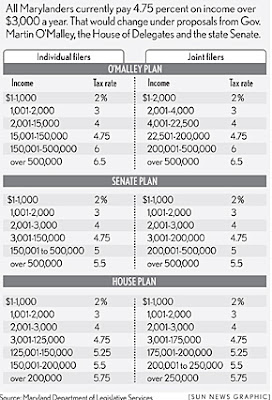By a vote of 86-52 (just one more vote than required), the House of Delegates approved a referendum on slots:
Following hours of debate, the House passed a version of Gov. Martin O'Malley's slots referendum bill by a 86-52 vote.
The House amended the bill, which identifies five locations around Maryland, to stipulate that slot parlors must comply with local planning and zoning laws. The change could give local officials more say over slot parlors in their jurisdictions. . . .
Under O'Malley's plan, voters would decide in November 2008 whether to allow 15,000 slot machines at five locations -- one each in Baltimore City and in Anne Arundel, Allegany, Cecil and Worcester counties.
Legislators narrowly voted to reject an amendment to remove Ocean Downs (Worcester County) from the list of locations. The Republican delegate representing Cecil also pleaded for the House to give his constituents the chance to vote on slots for their locality. The House amendment to require compliance with local planning and zoning laws should allow localities to reject slots.
We'll see if the conference committee (in which ardently pro-slots Senate President Mike Miller will have a lot of influence) retains it. My guess is they do because they probably won't be able to pass the final version in the House without it.
The House narrowly
rejected an amendment, offered by Del Luiz Simmons (D-19), which would have required slots to be located only in jurisdictions which vote in favor of the referendum:
Another measure failed, 67 to 61, that would have allowed slots parlors only to be located in jurisdictions in which a majority of voters approve the statewide referendum next November.
Simmons, who introduced the amendment, said it would be a way to "make sure that smaller jurisdictions are not victimized by larger jurisdictions."
This was a very clever amendment. It was naturally appealing as it would have helped to assure local control and perhaps appealed to legislators as a means of mitigating backlash against votes in favor of slots by giving their constituents the final say for their areas. At the same time, it would have provided a real incentive for a vote against slots by making it a vote on slots in your area. In Montgomery, for example, polls showed voters favorable to slots in Maryland but much less keen on slots in the County.
The
Baltimore Sun reported
who voted yea and nay on slots. Among delegates from Montgomery, the following delegates voted against the bill: Saqib Ali (D-39), Charles Barkley (D-39), Ben Kramer (D-19), Heather Mizeur (D-20), Luiz Simmons (D-17), Herman Taylor (D-14), and Jeff Waldstreicher (D-18). Karen Montgomery (D-14) did not vote.
Electoral Ramifications?While many senators have good relationships with their delegates, others resemble that of Queen Victoria and the Prince of Wales. The referendum may settle the issue definitively, or it may become hotly contested and close in a manner that sets up interesting legislative primaries for 2010. In Districts 15, all state legislators voted in favor. However, in District 16, Sen. Brian Frosh voted against while all three delegates voted in favor.
Luiz Simmons of District 17 was probably the most vocal slots opponent in the House but Sen. Jennie Forehand voted for the bill. In District 18, Sen. Rich Madaleno voted yea but Del. Jeff Waldstreicher voted nay. Sen. Rona Kramer of District 14 voted yes while Del. Herman Taylor voted no. Finally, and perhaps most intriguingly, Del. Saqib Ali of District 39 voted against slots while recently appointed Sen. Nancy King voted for slots.
Update:The grapevine is reporting that some people are taking the above post to mean that the above delegates all plan to challenge the above senators. Wrong. As I mentioned, many delegations get along well and individual delegates might not want to challenge sitting senators for a number of reasons. It isn't even clear that this issue will be that potent, especially after the people vote on the referendum.
Nevertheless, this sort of issue is precisely the type on which someone who wanted to mount a challenge could, even if I would be surprised to see it rise to anywhere near the level of the abortion votes which allowed several delegates to oust sitting senators in an earlier decade. However, see
Eric Luedtke's post over at freestatepolitics for his opinion on potential likely pairings or people who might use the vote to stand out over other potential successors if the senator chooses to retire.
Read More...
Summary only...













